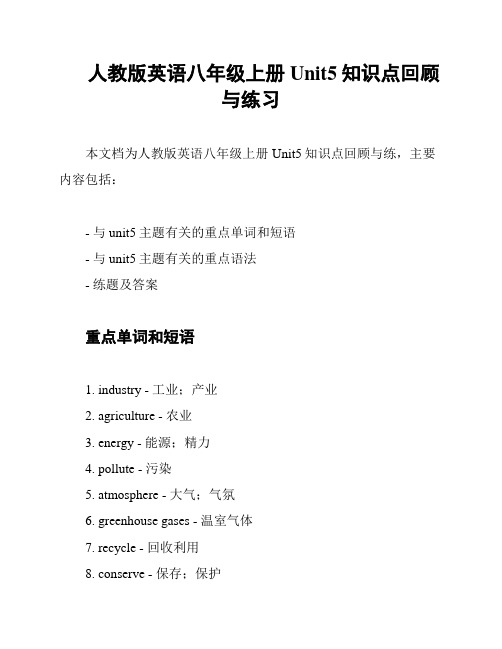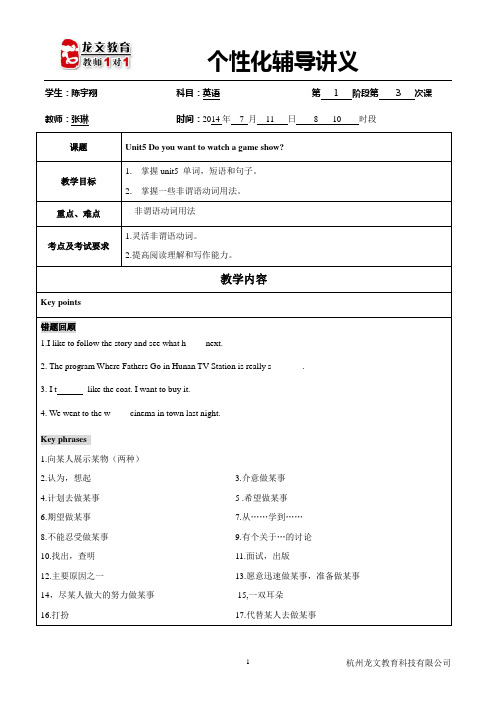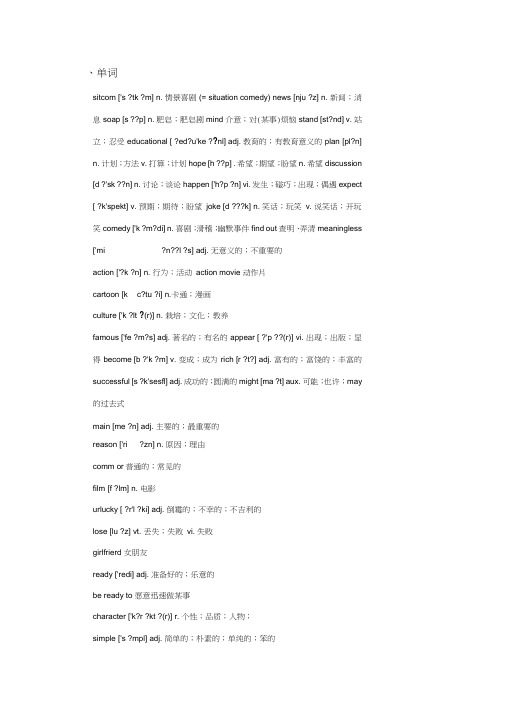人教新目标英语八年级上册Unit5单元知识点总结+练习题(无答案)
新目标英语八年级上第5单元知识讲解及练习

新目标英语八年级上第5单元知识讲解及练习含答案Unit 5Can you come to my party?【重要词汇概览】◆lesson n. 课,课程◆calendar n. 日历,行事历◆tomorrow n. 明天◆invitation n. 邀请◆match n. 比赛,竞赛◆whole adj. 整整的,全部的,完整的【重要词组概览】◆baseball game棒球比赛◆the day after tomorrow后天◆come over to从一地方来到另一个地方,过来◆go to the doctor去看病◆have a piano lesson上钢琴课◆have to不得不◆text time下一次◆study for a test准备考试◆be free有空儿,有时间【语法知识聚焦】1. have to 与情态动词的区别情态动词不能单独作谓语,后面必须接动词原形一起构成谓语,have to 也是这样。
情态动词没有人称和数的变化,而且所用的时态也受到一定的限制,但是have to 有人称和数的变化,可用于多种时态中,在一般现在时中,当主语是第三人称单数时,要用has to, 其余人称用have to;一般过去时中用had to;一般将来时中用will have to, 例如:She has to go to school by bus.她不得不乘公共汽车去上学。
If you get ill, you'll have to see the doctor.如果你生病的话,你就得看医生。
2. have to 与must 的区别have to 和must 都有“必须”的意思,那么它们有哪些不同呢?(1) 含义和用法上的区别:have to 强调客观上需要做某事,即表示外界条件的需要不得不做某事,含有“形势逼迫”的意味;must 强调说话者主观上认为必须做某事,含有“主观判断”的意味,例如:My bike was broken on my way to school. I had to walk there.我的自行车在上学的路上坏了,我不得不走路去上学。
人教版英语八年级上册Unit5知识点回顾与练习

人教版英语八年级上册Unit5知识点回顾与练习本文档为人教版英语八年级上册Unit5知识点回顾与练,主要内容包括:- 与unit5主题有关的重点单词和短语- 与unit5主题有关的重点语法- 练题及答案重点单词和短语1. industry - 工业;产业2. agriculture - 农业3. energy - 能源;精力4. pollute - 污染5. atmosphere - 大气;气氛6. greenhouse gases - 温室气体7. recycle - 回收利用8. conserve - 保存;保护9. wildlife - 野生动植物重点语法1. 现在进行时- 表示现在正在进行或发生的动作- 构成:be + 现在分词- 例句:We are recycling paper and plastic to help the environment.2. 物主代词- 表示所有关系- 例句:We should all conserve our natural resources.练题1. 用所给词的适当形式填空- We should try our best to __pollute__ (pollute) less.- ______ Wildlife (wildlife) is important to us.- The ______ atmosphere (atmosphere) is getting worse and worse.2. 选择填空- The earth's ___ (energy, atmosphere) is being damaged by pollution.- The government should encourage people ___ (conserve, conserving) water and electricity.答案1. pollute, wildlife, atmosphere2. is, atmosphere, conserve。
新人教版八年级上unit5知识总结与练习

学生:陈宇翔科目:英语第 1 阶段第 3 次课教师:张琳时间:2014年7 月11 日8-----10 时段课题Unit5 Do you want to watch a game show?1. 掌握unit5 单词,短语和句子。
教学目标2. 掌握一些非谓语动词用法。
重点、难点非谓语动词用法1.灵活非谓语动词。
考点及考试要求2.提高阅读理解和写作能力。
教学内容Key points错题回顾1.I like to follow the story and see what h____ next.2. The program Where Fathers Go in Hunan TV Station is really s_______.3. I t like the coat. I want to buy it.4. We went to the w____ cinema in town last night.Key phrases1.向某人展示某物(两种)__________________________ __________________________2.认为,想起__________________________3.介意做某事__________________________4.计划去做某事__________________________ 5 .希望做某事__________________________6.期望做某事______________________7.从……学到……______________________8.不能忍受做某事________________ 9.有个关于…的讨论___________________10.找出,查明__________________________ 11.面试,出版__________________________12.主要原因之一__________________________ 13.愿意迅速做某事,准备做某事______________ 14,尽某人做大的努力做某事________________ 15,一双耳朵__________________________16.打扮__________________________ 17.代替某人去做某事_______________18.干得好__________________________ 19.发生,继续__________________________20.看新闻__________________________看某人正在做某事__________________________看见某人做过或经常做某事__________________________21.因为……而出名__________________________作为……而出名__________________________22.你认为体育节目怎么样?(两种)________________________________________________________________________________________________________________________________________23.在世界周围正在发生什么?(两种)________________________________________________________________________________________________________________________________________Key points of unit 51.unlucky adj. 不幸的;不吉利的un-(否定前缀)+lucky luck n.运气lucky adj. 幸运的luckily adv. 幸运地2.happen v. 发生;出现辨析:happen与take placehappen 意为“发生;碰巧”,一般用于偶然或突发性事件1.What happened to you?2. I happened to see my old friend on my way home.take place 意为“发生;举行;举办”,一般只非偶然性事件的“发生”,即这种事件的发生一定有某种原因或事先的安排1.Great changes have taken place in China.2.The meeting will take place next Friday.3.successful adj. 获得成功的;有成就的(指人时表示“出人头地的或飞黄腾达的”;指事物时表示“如愿以偿的”)success+-ful(形容词后缀)succeed v.成功success n.成功successfully adv.成功地4.hope v. & n. 希望辨析:hope和wishhope 指对实现某一愿望有信心、把握(hopeto do sth.)I hope to see you next week.wish 常指难以实现或不能实现的愿望(wishsb. to do sth.)I wish I could have a new car.5. think of 认为think of表示“考虑”时,与think about同义;当表示“记起;想起”时,相当于remember.What do/does +主语+ think of···?用于询问他人的看法,与How do/does+主语+like···?句型同义,意为“你认为···怎么样?”Eg. What does he think of his English teacher? = How does he like his English teacher?6. learn from 从···获得;向···学习该短语用于两种情况:learn from sb./sth.或learn sth. from sb./sth.7. find out 查找;弄清楚(find意为“找到”)8. talk show 谈话节目 a TV show 一档电视节目show作动词时,常见短语:show sb. sth.=show sth. to sb. 给某人展示某物9. go on 发生(p34)(此处相当于“take place”)10. as famous as 与···一样有名辨析:be famous for, be famous as, be famous tobe famous for 因为···而出名后接闻名的原因,与be known for同义This place is famous for its cotton(棉花).be famous as 作为···而闻名后接表示职位、名称等的词,与be knownas同义Jet Li(李连杰) is famous as a great actor in the world.be famous to 为···所熟知后接某部分人This singer is famous to lotsof old people.11. around the world = all over the world全世界12. have a discussion about 就···讨论discussion 是discuss的名词形式13. such as 例如辨析:such as 和for examplesuch as 用来列举同类人或事物中的几个例子Some of the European languages come from Latin,such as French and Spanish.for example 一般只以同类事物或人中的“一个”为例,做插入语,用逗号隔开,可置于句首、句中和句末。
人教版新目标八上Unit5知识点背诵与练习(无答案)

知识点1 hope n & v 希望后跟动不定式或 that从句,that可省略。
I hope to visit that village again.=I hope(that)I can visit that village again.我希望再次拜访那个村庄。
知识点2辨析: look for , find out, findlook for 意为“寻找”,强调找的动作,是延续性动词,find意为“找到、发现、感到”,强调找的结果,是非延续性动词.find out意为“查明、发现、了解”,指经过认真观察、调查或研究把某事、某物查出来、搞清楚,多用于复杂而不容易直接查出的情况. At last he found out the truth.最后他查明了真相。
知识点3 happen用法happen vi. 不及物动词, 发生. 常指具体事件的发生,特别指那些偶然的或未能预见的事件的“发生”。
happen(s/ed) to sb. 某人发生了某事 happened to do sth. 意为“某人碰巧做某事”。
A bad accident happened to him.他出了严重的事故。
I happened to meet her in the shop.我碰巧在商店里遇到了她。
辨析: happen/take place①两者都表示“发生”,两者都是不及物动词,无被动语②happen表示“(偶然)发生”;take place表示“某事按照预先计划、安排而发生”。
知识点4 expect 用法expect 动词,意为“预料、期待”,后接名词、代词、动词不定式或从句。
①expect to do sth . I expect him to be back on Sunday.②expect that + 从句l expect that he will be back on Sunday.知识点5 plan 用法 n&v 计划,打算①make a plan (to ) do sth 制定计划 What's your plan for the weekend?你计划如何过周末?②plan to do sth. 计划做某事 My family plan to visit Italy this summer.我的家人计划今年夏天去意大利旅游。
人教新目标英语八年级上册Unit5--6单元测试题(无答案)

人教新目标英语八年级上册Unit5单元测试题(无答案)一单项选择(共25 小题,每小题1分,满分25分)从A、B、C、D 四个选项中,选出可以填入空白处的最佳选项,并将其字母代号填入答题纸相应题号的括号内。
()1 一What’s on your desk, Cathy?一There’s _____ interesting book about animals.A. aB. anC. theD./( ) 2. We have no time to play. We have ______ homework to do.A. too muchB. much tooC. too manyD. many too( ) 3. Can you________ my house to have a meeting tonight?A. come over toB. come back toC. leave forD. have a look at( )4 . Thanks for ______ me to your party.A. inviteB. invitesC.to inviteD. inviting( ) 5. — Can you go to the concert with me this afternoon?— Yes, ______.A. I’d likeB. I’d love toC. I would loveD. Yes, I do( ) 6. They often play ______ after school.A. the soccerB. tennisC. a volleyballD. basketballs( ) 7. I’m going to the movies ______ my friends.A.toB. andC. orD. with( ) 8. — Can you come to my party on Sunday?—______, I can’t. I have to go to the doctor’s.A. YesB. SureC. SorryD. Not( ) 9. ______ telling me the news.A. Thanks you forB. Thanks forC. Thank youD. Thank( ) 10. I’m sorry, ______ I can’t go to the movies with you.A. andB. soC. orD. but( ) 11. —What’s Susan doing? —She’s ______ her sister.A. babysitB. babysitsC. babysitting( ) 12. Emma, come here. Here ______ an apple for you.A. isB. areC. haveD. has( ) 13. They arrived there ______ cold Sunday afternoon.A. to theB. on aC. in aD. at a( ) 14. ______ is between Tuesday and Thursday.A. WednesdayB. FridayC. MondayD. Sunday( ) 15. I have to________for the math test.A.studyB.studyingC.learningD.studied( ) 16.You can see many good programs ______TV.A.on theB.over theC.over D .on( ) 17. Please practice________ English every day.A. speakB. to speakingC. speakingD. to speak( ) 18. ---____ I watch TV now. Mum--- Sure, but you___ finish your homework first.A. Must; needn'tB. Can; mayC. Can; mustD. May; mustn't( ) 19. I don’t like the color of the T-shirt. Would you show me __________one?A. otherB. the otherC. anotherD. others( ) 20. __________ me carefully, boys and girls. Can you _____________me?A. Listen to; hear fromB. Hear; listen toC. Hear; hearD. Listen to; hear( ) 21. --- Do you want to go to the cinema with me ?--- Sorry, I am busy ______ midnight.A. toB. tillC. fromD. /( ) 22. One of my best friend ________ going to _______ me next month.A. is; comeB. is; visitC. are; playD. are; enjoy( ) 23. Our school is only ___________ walk from here.A. five-minuteB. five minute’sC. five minutesD. five minutes( ) 24. I didn’t go to bed _______ my father came back late last night.A.soB. untilC. thoughD. although( ) 25. Whose shirt is th is ? It ____be li lei’s. It is too big for himA couldB mustC can’tD might一、语音(共5小题;每小题1分,满分5 分)从A、B、C、D 四个选项中选出划线部分读音与其它三个不同的一个,并将其字母代号填入答题纸相应题号的括号内。
人教新目标英语八年级上册Unit-5重难点总结+练习题(无答案)

人教新目标英语八年级上册Unit 5 Do you want to watch a game show?一、重点短语plan to do sth打算做某事hope to do sth希望做某事find out 查明;弄清discuss about sth with sb与某人讨论某事stand up站立happen to sb 碰巧发生..expect sb to do sth期待某人做某事play a joke on sb开某人玩笑action movie动作片be famous for..因...而出名be famous as 作为...be ready to do sth愿意迅速做某事dress up装扮;乔装打扮take one’s place代替;替换do a good job干得好around the world= all over the world全世界in the 1930s在20世纪30年代二、重点词汇1.newsn. news 新闻,新闻节目,不可数名词。
表示“一则新闻”用a piece of news。
There are two pieces of news in today’s newspaper.今天的报纸上有两则新闻。
2.mindv. mind 介意,反对,常用于疑问句、否定句或条件状语从句中,后接名词、代词或动名词。
I don’t mind cigarette smoke.我不在乎烟味。
Would you mind if I smoke here? 我在这儿抽烟你介意吗?3.planDo you plan to watch the news tonight? 今晚你计划看新闻吗?v. plan 计划,打算,后接名词、不定式或从句。
He plans a trip this weekend. 本周末他计划去旅行。
We begin to plan what we will do with this Sunday.我们开始计划怎样度过本周日。
人教版八年级上册unit5知识点及练习

、单词sitcom ['s ?tk ?m] n. 情景喜剧(= situation comedy) news [nju ?z] n. 新闻;消息soap [s ??p] n. 肥皂;肥皂剧mind 介意;对(某事)烦恼stand [st?nd] v. 站立;忍受educational [ ?ed?u'ke ??nl] adj. 教育的;有教育意义的plan [pl?n] n. 计划;方法v. 打算;计划hope [h ??p] . 希望;期望;盼望n. 希望discussion [d ?'sk ??n] n. 讨论;谈论happen ['h?p ?n] vi. 发生;碰巧;出现;偶遇expect [ ?k'spekt] v. 预期;期待;盼望joke [d ???k] n. 笑话;玩笑v. 说笑话;开玩笑comedy ['k ?m?di] n. 喜剧;滑稽;幽默事件find out 查明、弄清meaningless ['mi ?n??l ?s] adj. 无意义的;不重要的action ['?k ?n] n. 行为;活动action movie 动作片cartoon [k c?tu ?i] n.卡通;漫画culture ['k ?lt ?(r)] n. 栽培;文化;教养famous ['fe ?m?s] adj. 著名的;有名的appear [ ?'p ??(r)] vi. 出现;出版;显得become [b ?'k ?m] v. 变成;成为rich [r ?t?] adj. 富有的;富饶的;丰富的successful [s ?k'sesfl] adj. 成功的;圆满的might [ma ?t] aux. 可能;也许;may 的过去式main [me ?n] adj. 主要的;最重要的reason ['ri ?zn] n. 原因;理由comm or普通的;常见的film [f ?lm] n. 电影urlucky [ ?r'l ?ki] adj. 倒霉的;不幸的;不吉利的lose [lu ?z] vt. 丢失;失败vi. 失败girlfrierd 女朋友ready ['redi] adj. 准备好的;乐意的be ready to 愿意迅速做某事character ['k?r ?kt ?(r)] r. 个性;品质;人物;simple ['s ?mpl] adj. 简单的;朴素的;单纯的;笨的dress up 装扮;乔装打扮take sb. ' s place 代替;替换army [' a mi] n.军队;陆军;一大批do a good job 工作干得好;做得好重点单词1 educational adj. 教育的;有教育意义的educatio n ( 教育)+ al 宀educatio nal; 多音节形容词,其比较级及最高级形式在其前加more,most 构成。
2021年八年级上册英语第五单元 unit 5知识点及练习题

2021年八年级上册英语第五单元 unit 5知识点及练习题2021年八年级上册英语第五单元unit5知识点及练习题八年级试卷和教学计划八上unit5短语和句型growup成长;长大everyday每天besureabout对……有把握makesure确信;务必send…to…把……送到……beableto能意思是。
不同的种类不同的种类writedown写下;记下havetodowith关于;与……有关系takeup开始做;学着做hardlyever几乎不;很少too…to…太……而不能……/太……以至于不能findout:查出,查明动词的原形是要做某事keepondoingsth.不断地做某事learntodosth.学会做某事finishdoingsth.做完某事promisetodosth.许诺去做某事helpsb.todosth.帮助某人做某事remembertodosth.记住做某事agreetodosth.同意做某事爱死了。
想做某事想做某事1.---doyoumindmycarhere?---no,ofcoursenot.a.toparkBparkCparkingD请选择合适的词填空寻找find芬多特2.---whatareyou?---mypen.停放八年级试卷、教案3.--你的铅笔好吗?--是的,它在我的包里。
4.pleasehowyourfatherwillgotoshanghai.exciting激动的5.wow,justnowlipingtoldmeapieceofnews.6.wangjunwastoseehisoldfriendatthesuperm arket.1.解析:minddoing,故选c。
2.3.4. 解析:lookfor:表示搜索操作;Find表示搜索的结果,more表示找到了什么;发现:它意味着发现,发现,更多地了解结果和事实真相。
因此,标题2正在寻找,标题3是查找,标题4是查找5 6。
- 1、下载文档前请自行甄别文档内容的完整性,平台不提供额外的编辑、内容补充、找答案等附加服务。
- 2、"仅部分预览"的文档,不可在线预览部分如存在完整性等问题,可反馈申请退款(可完整预览的文档不适用该条件!)。
- 3、如文档侵犯您的权益,请联系客服反馈,我们会尽快为您处理(人工客服工作时间:9:00-18:30)。
人教新目标英语八年级上册Unite 5 Do you want to watch a game show?一、词组、短语:1.talk show 访谈节目2. sports show 体育节目3. game show 娱乐节目4.talent show 达人秀5. have a discussion 进行讨论6. watch news 看新闻7. find out找出,查出,查明8.watch action movies看动作电影 9. watch cartoons看动画片10. the black mouse with two large round ears 长着两只大圆耳朵的黑色老鼠11. over 80 years ago 八十多年前 12. on November 18,1928 在1928年11月18日13. the first cartoon with sound and music第一步有声音和音乐的动画片14. in the 1930s 在20世纪30年代 15. as famous as…和……一样著名16. one of the main reasons 要的理由之一 17. be ready to do sth. 愿意做某事;为…做准备18. dress up 装扮;乔装打扮 19. take sb’s place 代替;替换 20. do a good job 干得好21.let sb. do sth. 让某人做某事 22. plan to do sth. 计划/打算做某事23.hope to do sth. 希望做某事 24. happen to do sth. 碰巧做某事25.expect to do sth. 盼望做某事. 26. How about doing…?做……怎么样?27.try one’s best to do sth. 尽力做某事28. think of 想起、认为 think about 思考、考虑二、习惯用法、搭配----What do you think of talk shows?----I don’t mind them. I hope to be a TV reporter one day. How about you?三、惯用法、搭配1、let sb. do sth.让某人做某事,2、plan to do sth.计划做某事,3、hope to do sth. 希望做某事,4、happen to do sth碰巧发生某事,5、expect to do sth. 期望做某事,6、How about doing…?= What about…?做某事怎么样?7、be ready to do sth.准备做某事, 8、try one’s best to do sth.=do one’s best to do sth.尽力做某事,语法:Do you want to watch the news? Yes, I do . / No, I don’t.What can you plan to watch tonight? I plan to watch Days of Our Past. What do you expect to learn from sitcoms? You can learn some great jokes.Why do you like watching the news? Because I hope to find out what’s going on around the world. What do you think of talk shows? I don’t mind them./ I can’t stand them!/ I love watching them!词语辨析1.the other, the others, other, others, another 辨析2.the other 表示特指两个或者两部份中的另一个或另一部分,可直接单数名词或复数名词。
表示两个中的一个……另一个……时,常用one …the other…。
例:He has two brothers, one is a teacher, the other is a doctor.There are forty students in our class. twenty-one are girls, the other nineteen are boys. the others 特指某一范围内的其他的(人或物),是the other的复数形式,相当于the other+复数名词。
the other + 复数名词 = any other + 名词单数。
例:You two stay here, the others go with me.I’m different from Jeff because I’m louder than the other kids (any other kid) in my class. other 作代词或形容词,可修饰可数名词单数或复数。
例:We learn Chinese, Maths, English and other subjects. others 作代词,泛指“其他的人或物”。
例:Some students are doing homework, others are talking loudly.another 泛指同类事物中的三者或三者以上的“另一个”,只能代替或修饰单数可数名词。
例:I don’t like this one. Please show me another one. another two students = two more students 2.look see watch的区别 look强调看的动作,接宾语时要加atSee强调看的结果,还有看望,明白等意思Watch一般精力比较集中,如看电视、演出、球赛等watch the football game语言点讲解1、think of = think about 认为What do you think of (=how do you like )this movie? 你认为这个电影怎么样What does your father think of his boss? How about doing…?做……怎么样?2、I don’t mind them. 我不介意他们。
mind: n 头脑、想法 change one’s mind改变主意 make up one’s mind 下决心 mind: v介意;在乎;反对。
多用于以下句型:(表示请求或征求意见) Would you mind doing …?Would you mind opening the door? Do you mind …? Do you mind my dog?3、I can’t stand it! 我不能忍受它/我受不了它! stand: 顺利接受;忍受(多用于否定句、疑问句)4、I do, too. / I don’t, either. 我也… / 我也不… too 与either的区别:too“也”,表示肯定意义,与肯定的表达方法连用;而either “也不”,表示否定意义,与否定的表达方法连用。
--My brother likes to play soccer. ?I do, too.--My brother doesn’t like to play soccer. ?I don’t, either.5、a thirteen-year-old boy 一个十三岁的男孩。
此结构中,year用单数形式,且用连字符,类似的结构还有: five-month-old baby 五个月大的婴儿试比较: He is a student. He is thirteen years old. He is a thirteen-year-old student.6、hair clip 发卡有关hair的其他几个常见短语:hair band 发带, hair cut发型,发式;理发(名词), hair dresser理发师7、happenSth happen +时间/地点某时某地发生了什么 Sth happen to sb 某人出了某事(不好的事情) Sb happen to do sth 某人碰巧做某事 It happened that 碰巧发生某事8、be famous/well-known for因什么而出名 Be famous/well-known as 作为什么而出名as famous as与……一样有名9、dress up 盛装打扮 dress sb up/dress uo sb.盛装打扮某人 dress sb /oneself 给某人穿衣服get dressed 穿衣服 put on 穿衣服(强调动作)wear穿衣服(强调状态)重难点知识动词不定式做宾语let sb. do sth.让某人做某事 plan to do sth.计划/打算做某事 hope to do sth.希望做某事 happen to do sth.碰巧做某事expect to do sth.盼望做某事 be ready to do sth.乐于做某事 try one’s best to do sth.尽力做某事有些动词只能接不定式做宾语。
例如:help,hope,ask,refuse,decide,promise,wish,pretend,expect,learn,plan,manage,agree,fail,offer,happen,seem等等。
例如: He refused to speak on the radio.二、有些动词或短语只接动名词做宾语:例如:mind,finish,enjoy,suggest,consider,miss,keep(on),avoid避开,躲开,stand(忍受),allow ,practice,give up,put off,look forward to期待,期望,feel like 想要做某事,prevent…from,阻止can't help禁不住,不由自主迫不及待,be/get used to ,be worth doing,be busy doing 例如:His wife doesn't allow smoking inside the room and often advised him to give up smoking. I'm looking for ward to hearing from you soon.She doesn't feel like eating anything,being ill for a few days.后面加动名词与不定式时语义不同的1、stop to do 停止,中断做某事后去做另一件事。
